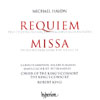Haydn Requiem; Missa in honorem Sanctae Ursulae
Out of the shadows: Michael Haydn’s richly inventive Requiem and Mass
View record and artist detailsRecord and Artist Details
Composer or Director: (Johann) Michael Haydn
Genre:
Vocal
Label: Hyperion
Magazine Review Date: 6/2005
Media Format: CD or Download
Media Runtime: 84
Mastering:
Stereo
DDD
Catalogue Number: CDA67510

Tracks:
| Composition | Artist Credit |
|---|---|
| Missa pro defuncto Archiepiscope Sigismundo |
(Johann) Michael Haydn, Composer
(Johann) Michael Haydn, Composer (The) King's Consort Carolyn Sampson, Soprano Hilary Summers, Contralto (Female alto) James Gilchrist, Tenor King's Consort Choir Peter Harvey, Bass Robert King, Conductor |
| Missa in honorem Sanctae Ursulae |
(Johann) Michael Haydn, Composer
(Johann) Michael Haydn, Composer (The) King's Consort Carolyn Sampson, Soprano Hilary Summers, Contralto (Female alto) James Gilchrist, Tenor King's Consort Choir Peter Harvey, Bass Robert King, Conductor |
Author: David Vickers
The King’s Consort have made forays into later 18th-century repertoire before, although none as vital as this. Robert King suggests that Michael Haydn’s Requiem for the Archbishop-Prince of Salzburg (composed in 1771) reflects a personal outpouring of grief for the loss of Haydn’s beloved patron and the recent death of his infant daughter. The fervent expressions of grief, consolation and hope must have made some impression on the 15-year-old Mozart, whose unhappy disengagement from Salzburg a decade later resulted from his volatile relationship with the new Archbishop Colloredo.
A comparison of Haydn’s Requiem with Mozart’s setting composed 20 years later is inevitable: Haydn did not give his solo quartet anything that compares with the immediacy of Mozart’s ‘Tuba mirum’, but the older man’s masterful choral writing, brilliant orchestral scoring and sensitive use of solo voices created plenty of musical riches and dramatic moods, such as the brooding Kyrie and the bursting energy of the ‘Dies irae’.
The quartet of soloists is impeccable: I particularly enjoyed the rich, fruity contralto of Hilary Summers seamlessly leading into the lyricism of James Gilchrist and Peter Harvey in the first section of ‘Hostias et preces tibi’, and Carolyn Sampson’s elegant introduction to the Agnus Dei. The choir and orchestra of The King’s Consort prove to be increasingly assured and dynamic with each recording released. Robert King’s measured and emphatic direction makes it easy to appreciate why the Requiem was performed at his brother Joseph’s funeral in 1809. King perfectly balances stylish performance practice with the necessary grandeur and radiance.
His interpretation of the sunnier, extrovert Missa in honorem Sanctae Ursulae (composed in 1793, perhaps to celebrate Haydn’s friend Ursula Oswald taking holy orders) helps the music to sound natural and spontaneous. In some respects, the Mass is an even finer composition, full of charismatic and inventive musical charms (it is worth buying for Carolyn Sampson’s ravishing ‘Benedictus’ alone).
Anybody who enjoys the choral works of Mozart and Joseph Haydn will be delighted by this double-disc set, and will probably concur that Michael Haydn’s neglect in the shadow of his younger friend and older brother is substantially corrected by these exquisite performances.
A comparison of Haydn’s Requiem with Mozart’s setting composed 20 years later is inevitable: Haydn did not give his solo quartet anything that compares with the immediacy of Mozart’s ‘Tuba mirum’, but the older man’s masterful choral writing, brilliant orchestral scoring and sensitive use of solo voices created plenty of musical riches and dramatic moods, such as the brooding Kyrie and the bursting energy of the ‘Dies irae’.
The quartet of soloists is impeccable: I particularly enjoyed the rich, fruity contralto of Hilary Summers seamlessly leading into the lyricism of James Gilchrist and Peter Harvey in the first section of ‘Hostias et preces tibi’, and Carolyn Sampson’s elegant introduction to the Agnus Dei. The choir and orchestra of The King’s Consort prove to be increasingly assured and dynamic with each recording released. Robert King’s measured and emphatic direction makes it easy to appreciate why the Requiem was performed at his brother Joseph’s funeral in 1809. King perfectly balances stylish performance practice with the necessary grandeur and radiance.
His interpretation of the sunnier, extrovert Missa in honorem Sanctae Ursulae (composed in 1793, perhaps to celebrate Haydn’s friend Ursula Oswald taking holy orders) helps the music to sound natural and spontaneous. In some respects, the Mass is an even finer composition, full of charismatic and inventive musical charms (it is worth buying for Carolyn Sampson’s ravishing ‘Benedictus’ alone).
Anybody who enjoys the choral works of Mozart and Joseph Haydn will be delighted by this double-disc set, and will probably concur that Michael Haydn’s neglect in the shadow of his younger friend and older brother is substantially corrected by these exquisite performances.
Discover the world's largest classical music catalogue with Presto Music.

Gramophone Digital Club
- Digital Edition
- Digital Archive
- Reviews Database
- Full website access
From £8.75 / month
Subscribe
Gramophone Full Club
- Print Edition
- Digital Edition
- Digital Archive
- Reviews Database
- Full website access
From £11.00 / month
Subscribe
If you are a library, university or other organisation that would be interested in an institutional subscription to Gramophone please click here for further information.




